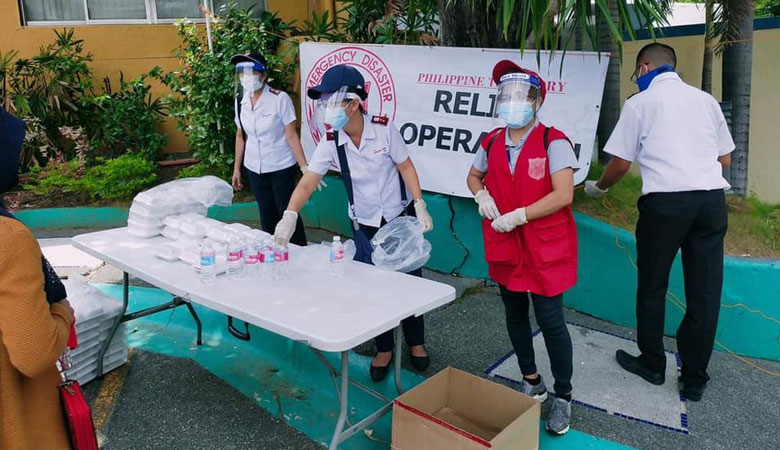Globally, in excess of 10 million cases of COVID-19 infection have now been recorded by the World Health Organization. Sadly, more than half a million deaths have resulted, and communities around the world are grappling with the realities of bereavement, economic disruption, hunger and the ever-present threat of disease. The Salvation Army stands firm in its support of the most vulnerable in society.
Hygiene, food and warmth
The Salvation Army in The Philippines is making a practical difference in public health provision by supplying hygiene kits and cleaning supplies to quarantine facilities in and around Manila. These locations include facilities such as requisitioned sports centres and other public buildings. Supplies including anti-bacterial soap, alcohol-based hand gel, detergent, bleach, health information leaflets and bags have been distributed.
 COVID-19 response in India
COVID-19 response in India
The Salvation Army in Johannesburg, South Africa, has also been helping to provide a ready supply of nutritional food to the most vulnerable individuals and families in neighbouring Lesotho. Food parcels have been distributed where the need is greatest in both countries.
Elsewhere in the southern hemisphere, as winter draws closer and the economic elements of the coronavirus crisis become clearer, The Salvation Army in Australia has developed the "coat tree." The Gold Coast town of Southport now has a number of trees sporting unusual "fruit" in the guise of warm coats. Anyone sleeping rough or simply in need of warmth can take a coat for free. From an initial supply of 30 garments, the trees’ supplies are topped up from Salvos Stores. Coat trees are now also springing up in New South Wales.
Employment
In the United Kingdom, The Salvation Army’s Employment Plus service has been drawing attention to unemployment resulting from COVID-19 economic factors. The service is warning that "unemployment will rise so fast, job centres will not be able to cope and the most vulnerable job seekers will be left behind."
Rebecca Keating, Director of the Employment Plus service which specializes in helping vulnerable people find work, says: "The odds were already stacked against vulnerable people finding work, and we are worried that some people could be locked out of the jobs market for years."
"David" one of those helped back into employment by The Salvation Army adds: "When COVID-19 happened I was in full-time employment and it was my ideal job but by the third extension of lockdown my employers decided to let me go. I was so worried about what was going to happen financially. However, I contacted The Salvation Army and after speaking to my advisor he found me a vacancy with the COVID-19 track and trace team. I now feel I’m making a difference again, not only to my family but to people affected by the coronavirus."
Education
The Salvation Army’s international Schools and Education unit based at International Headquarters in London has developed advice on the safe reopening of schools. With regulations and COVID-19 advice varying from country to country, some of The Salvation Army’s thousands of schools have managed to maintain provision of education.
This new advice offers support on how to assess the capacity of schools where physical distancing is required, along with details on how to ensure adequate hygiene provision. The framework also takes school leaders through issues such as planning reopenings or initiating altered provision of services, as well as advising on the training and support of teaching and ancillary staff and communicating changes effectively to pupils, parents and local authorities.
In some cases this will necessitate the transfer of learning to an online provision, such as at The Salvation Army’s Azam School in Karachi, Pakistan and in The Philippines. Other options are also being put into action, including in Guatemala, which is one of many countries where teachers at rural schools are making difficult journeys to provide lesson materials to pupils. In urban settings, teachers are using WhatsApp to communicate with parents and teach pupils who have no access to laptops or home computers. In Liberia, lessons are being taught online to pupils who are sitting exams, while water and sanitation preparations are being made for the return to school.
Drama and music
Back in Australia, while theatres and performing arts venues are still unable to operate, The Salvation Army has hit on a brand-new idea – the virtual musical. Three Bags Unpacked is based on the biblical story of the prodigal son, and is the brainchild of Melbourne-based Worship Arts coordinator for The Salvation Army, Julia Roper. As reported by others.org.au, the initiative will involve numerous 15- to 30-year-old performers participating from around the nation. The young stars will record their singing, acting, playing and dancing on their mobile telephones, tablets, cameras, desktop computers or other electronic means to be mixed together to produce the virtual musical.
"We probably would never have thought of it if we hadn’t been forced into a situation where we can’t travel or get hundreds of kids together in a space. So, although there is an intense amount of work involved, this is a really good alternative to still be inclusive and flexible. I think what’s exciting for all of us is the collaborative aspect of it," Mathieson enthuses.








Leave a Comment